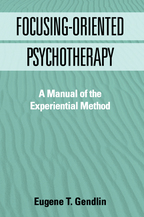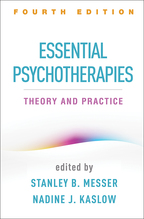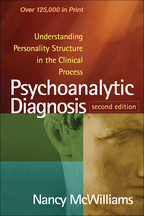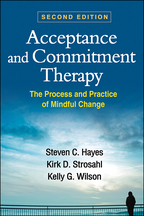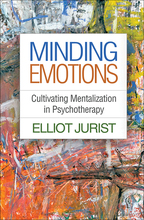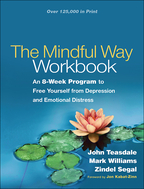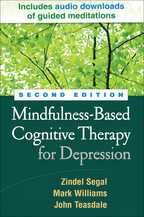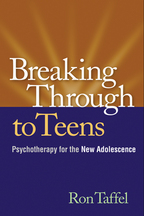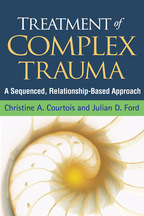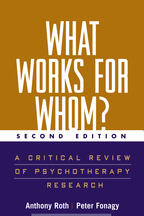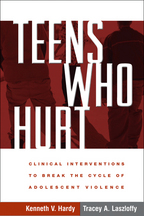Focusing-Oriented Psychotherapy
A Manual of the Experiential Method
Eugene T. Gendlin
HardcoverPaperbacke-bookprint + e-book
Hardcover
orderMarch 29, 1996
ISBN 9780898624793
Price: $75.00 317 Pages
Size: 6" x 9"
Paperback
orderAugust 10, 1998
ISBN 9781572303768
Price: $50.00317 Pages
Size: 6" x 9"
“A fine philosophical and practical contribution to the field of experiential psychology. Gendlin's perspective is, as always, fresh, informative, and open to the mystery and wisdom of the total person.”

—Journal of Supervision and Training in Ministry
“A clear, detailed, and sensitive examination of what goes on in the therapeutic process and in the process of transformation.”

—Common Boundary
“Every once in a while you read something which makes what you already know wake up and come alive once more. This is certainly such a book for me. But it is also much more. The work of a clinician who is also a philosopher, Gendlin's experiential psychotherapy—a process constructivism—brings powerful experiential techniques to enliven therapeutic contact in whatever therapeutic orientation. Beginners and old hands alike will find it extremely valuable, offering as it does step-by-step guidance on innovative ways to help clients learn from their own inner wisdom.”

—Maureen O'Hara, PhD, Center for Studies of the Person
“If you perceive Gene Gendlin as a person concerned exclusively with focusing, this book will change your mind. The book takes a broad and sweeping view of the whole domain of experiencing in psychotherapy. It shows how a wide variety of therapy technologies can be brought to bear in the service of a single central task, namely, that of fostering the quality of immediacy and livingness that is so necessary to the effectiveness of psychotherapy. Expect the book to provide an exciting in-depth challenge to you, whether you are an advanced student of psychotherapy or a practicing clinician.”

—Julius Seeman, PhD, Professor Emeritus in Psychology, Peabody College of Vanderbilt University
“This is a work of theoretical and technical brilliance. At a time when therapists of all orientations are attending to the empathic and experiential aspects of therapy, Gendlin builds upon his own pioneering work to elucidate an important domain of therapeutic knowledge in a way that makes many other treatments of the topic seem superficial by comparison. This is one of the more unique and creative contributions to the psychotherapy literature in years.”

—Jeremy D. Safran, PhD, Professor and Director of Clinical Psychology, New School for Social Research
“Gendlin offers a convincing argument and demonstration that it is attention to the experimental manner rather than the content that provides entry into the 'border zone' between the client's conscious and unconscious processing. This is a rich and clinically helpful book on a process-oriented approach to deepening clients' experience. It will be of great use to clinicians of all orientations in providing detailed accounts of how to deepen and enliven clients' bodily felt experience in order to facilitate the construction of new meaning. This book represents a major contribution to the effort to understand the process of change in psychotherapy.”

—Leslie S. Greenberg, PhD, Professor of Psychology, York University, Toronto, Canada
—Journal of Supervision and Training in Ministry
“A clear, detailed, and sensitive examination of what goes on in the therapeutic process and in the process of transformation.”
—Common Boundary
“Every once in a while you read something which makes what you already know wake up and come alive once more. This is certainly such a book for me. But it is also much more. The work of a clinician who is also a philosopher, Gendlin's experiential psychotherapy—a process constructivism—brings powerful experiential techniques to enliven therapeutic contact in whatever therapeutic orientation. Beginners and old hands alike will find it extremely valuable, offering as it does step-by-step guidance on innovative ways to help clients learn from their own inner wisdom.”
—Maureen O'Hara, PhD, Center for Studies of the Person
“If you perceive Gene Gendlin as a person concerned exclusively with focusing, this book will change your mind. The book takes a broad and sweeping view of the whole domain of experiencing in psychotherapy. It shows how a wide variety of therapy technologies can be brought to bear in the service of a single central task, namely, that of fostering the quality of immediacy and livingness that is so necessary to the effectiveness of psychotherapy. Expect the book to provide an exciting in-depth challenge to you, whether you are an advanced student of psychotherapy or a practicing clinician.”
—Julius Seeman, PhD, Professor Emeritus in Psychology, Peabody College of Vanderbilt University
“This is a work of theoretical and technical brilliance. At a time when therapists of all orientations are attending to the empathic and experiential aspects of therapy, Gendlin builds upon his own pioneering work to elucidate an important domain of therapeutic knowledge in a way that makes many other treatments of the topic seem superficial by comparison. This is one of the more unique and creative contributions to the psychotherapy literature in years.”
—Jeremy D. Safran, PhD, Professor and Director of Clinical Psychology, New School for Social Research
“Gendlin offers a convincing argument and demonstration that it is attention to the experimental manner rather than the content that provides entry into the 'border zone' between the client's conscious and unconscious processing. This is a rich and clinically helpful book on a process-oriented approach to deepening clients' experience. It will be of great use to clinicians of all orientations in providing detailed accounts of how to deepen and enliven clients' bodily felt experience in order to facilitate the construction of new meaning. This book represents a major contribution to the effort to understand the process of change in psychotherapy.”
—Leslie S. Greenberg, PhD, Professor of Psychology, York University, Toronto, Canada

